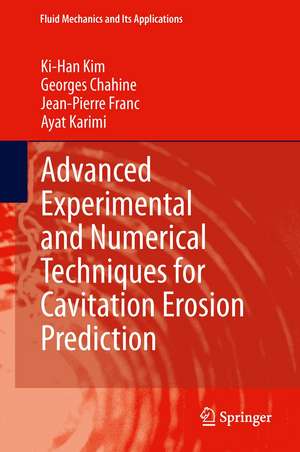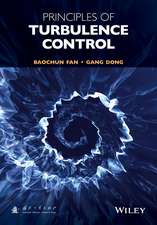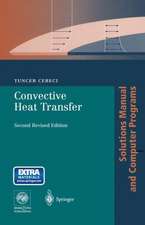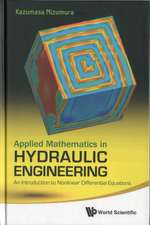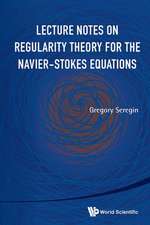Advanced Experimental and Numerical Techniques for Cavitation Erosion Prediction: Fluid Mechanics and Its Applications, cartea 106
Editat de Ki-Han Kim, Georges Chahine, Jean-Pierre Franc, Ayat Karimien Limba Engleză Hardback – 12 mar 2014
| Toate formatele și edițiile | Preț | Express |
|---|---|---|
| Paperback (1) | 646.43 lei 6-8 săpt. | |
| SPRINGER NETHERLANDS – 3 sep 2016 | 646.43 lei 6-8 săpt. | |
| Hardback (1) | 651.19 lei 6-8 săpt. | |
| SPRINGER NETHERLANDS – 12 mar 2014 | 651.19 lei 6-8 săpt. |
Din seria Fluid Mechanics and Its Applications
- 17%
 Preț: 462.79 lei
Preț: 462.79 lei - 18%
 Preț: 700.78 lei
Preț: 700.78 lei - 18%
 Preț: 1014.58 lei
Preț: 1014.58 lei - 17%
 Preț: 524.76 lei
Preț: 524.76 lei - 15%
 Preț: 646.30 lei
Preț: 646.30 lei - 18%
 Preț: 789.65 lei
Preț: 789.65 lei - 18%
 Preț: 780.82 lei
Preț: 780.82 lei - 20%
 Preț: 630.17 lei
Preț: 630.17 lei - 20%
 Preț: 696.89 lei
Preț: 696.89 lei - 18%
 Preț: 897.65 lei
Preț: 897.65 lei - 18%
 Preț: 1577.13 lei
Preț: 1577.13 lei - 15%
 Preț: 539.41 lei
Preț: 539.41 lei - 18%
 Preț: 1112.30 lei
Preț: 1112.30 lei - 18%
 Preț: 1116.89 lei
Preț: 1116.89 lei - 24%
 Preț: 1069.06 lei
Preț: 1069.06 lei -
 Preț: 443.31 lei
Preț: 443.31 lei - 15%
 Preț: 583.93 lei
Preț: 583.93 lei - 24%
 Preț: 1068.76 lei
Preț: 1068.76 lei - 24%
 Preț: 961.13 lei
Preț: 961.13 lei - 18%
 Preț: 835.15 lei
Preț: 835.15 lei - 18%
 Preț: 960.61 lei
Preț: 960.61 lei - 18%
 Preț: 949.55 lei
Preț: 949.55 lei - 18%
 Preț: 963.15 lei
Preț: 963.15 lei - 15%
 Preț: 590.27 lei
Preț: 590.27 lei - 15%
 Preț: 646.62 lei
Preț: 646.62 lei - 15%
 Preț: 655.78 lei
Preț: 655.78 lei - 18%
 Preț: 1660.65 lei
Preț: 1660.65 lei - 18%
 Preț: 1087.54 lei
Preț: 1087.54 lei - 15%
 Preț: 644.30 lei
Preț: 644.30 lei - 24%
 Preț: 786.42 lei
Preț: 786.42 lei - 18%
 Preț: 1582.35 lei
Preț: 1582.35 lei - 18%
 Preț: 958.07 lei
Preț: 958.07 lei
Preț: 651.19 lei
Preț vechi: 766.10 lei
-15% Nou
Puncte Express: 977
Preț estimativ în valută:
124.62€ • 129.31$ • 104.16£
124.62€ • 129.31$ • 104.16£
Carte tipărită la comandă
Livrare economică 15-29 martie
Preluare comenzi: 021 569.72.76
Specificații
ISBN-13: 9789401785389
ISBN-10: 9401785384
Pagini: 420
Ilustrații: XVII, 399 p. 290 illus., 220 illus. in color.
Dimensiuni: 155 x 235 x 28 mm
Greutate: 0.72 kg
Ediția:2014
Editura: SPRINGER NETHERLANDS
Colecția Springer
Seria Fluid Mechanics and Its Applications
Locul publicării:Dordrecht, Netherlands
ISBN-10: 9401785384
Pagini: 420
Ilustrații: XVII, 399 p. 290 illus., 220 illus. in color.
Dimensiuni: 155 x 235 x 28 mm
Greutate: 0.72 kg
Ediția:2014
Editura: SPRINGER NETHERLANDS
Colecția Springer
Seria Fluid Mechanics and Its Applications
Locul publicării:Dordrecht, Netherlands
Public țintă
ResearchCuprins
Foreword.- Preface.- Part I: Cavitation and Cavitation Erosion: Computational and Experimental Approaches.- 1 Cavitation and Cavitation Erosion.- 2 Laboratory Testing Methods of Cavitation Erosion.- 3 Pitting and Incubation Period.- 4 Cavitation Impulsive Pressures.- 5 Mass Loss and Advanced Periods of Erosion.- 6 Modeling of Cavitation Dynamics and Interaction with Material.- 7 Modeling of Material Response.- Part II: Selected Papers from the International Workshop on Advanced Experimental and Numerical Techniques for Cavitation Erosion Prediction (Grenoble, March 1-2, 2011).- 8 Hydrodynamic Processes Controlling Cavitation Erosion.- 9 On the Kinematics of Sheet and Cloud Cavitation and Related Erosion.- 10 Investigations into Dependence Between Cavitation Structures and Cavitation Erosion.- 11 Recent Investigations on Cavitation Erosion at the University of Fukui.- 12 Effect of Nozzle Geometry on Aggressivity of Cavitating Jet for Cavitation Erosion Test and Applications.- 13 Prediction of Cavitation Erosion and Residual Stress of Material Using Cavitating Flow Simulation with Bubble Flow Model.- 14 Assessment of Erosion Sensitive Areas via Compressible Simulation of Unsteady Cavitating Flows.- 15 Scaling of Cavitation Bubble Cloud Dynamics on Propellers.- 16 Numerical Simulations of Shock Emission by Bubble Collapse near a Rigid Surface.- Index.
Textul de pe ultima copertă
This book provides a comprehensive treatment of the cavitation erosion phenomenon and state-of-the-art research in the field. It is divided into two parts. Part 1 consists of seven chapters, offering a wide range of computational and experimental approaches to cavitation erosion. It includes a general introduction to cavitation and cavitation erosion, a detailed description of facilities and measurement techniques commonly used in cavitation erosion studies, an extensive presentation of various stages of cavitation damage (including incubation and mass loss), and insights into the contribution of computational methods to the analysis of both fluid and material behavior. The proposed approach is based on a detailed description of impact loads generated by collapsing cavitation bubbles and a physical analysis of the material response to these loads. Part 2 is devoted to a selection of nine papers presented at the International Workshop on Advanced Experimental and Numerical Techniquesfor Cavitation Erosion (Grenoble, France, 1-2 March 2011), representing the forefront of research on cavitation erosion. Innovative numerical and experimental investigations illustrate the most advanced breakthroughs in cavitation erosion research.
Caracteristici
Comprehensive treatment of both fluid and material aspects of cavitation erosion Includes the most relevant experimental methods and computational approaches to study cavitation erosion Includes a didactic and instructive presentation that can be used as a textbook for graduate students Presents state-of-the-art research useful for engineers and researchers in the field Provides predictive techniques of cavitation damage in hydraulic machineries such as propellers and pumps Describes cavitation damage in terms of microscopic and macroscopic phenomena in solid state plasticity Offers experimental and numerical inverse method tools to estimate impulsive pressures from materials damage Includes supplementary material: sn.pub/extras
